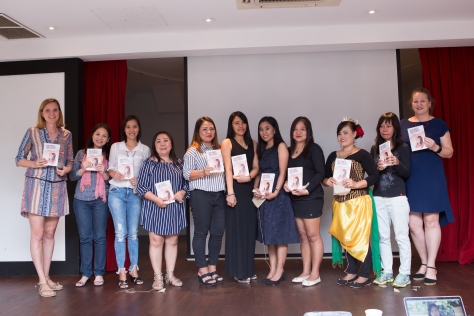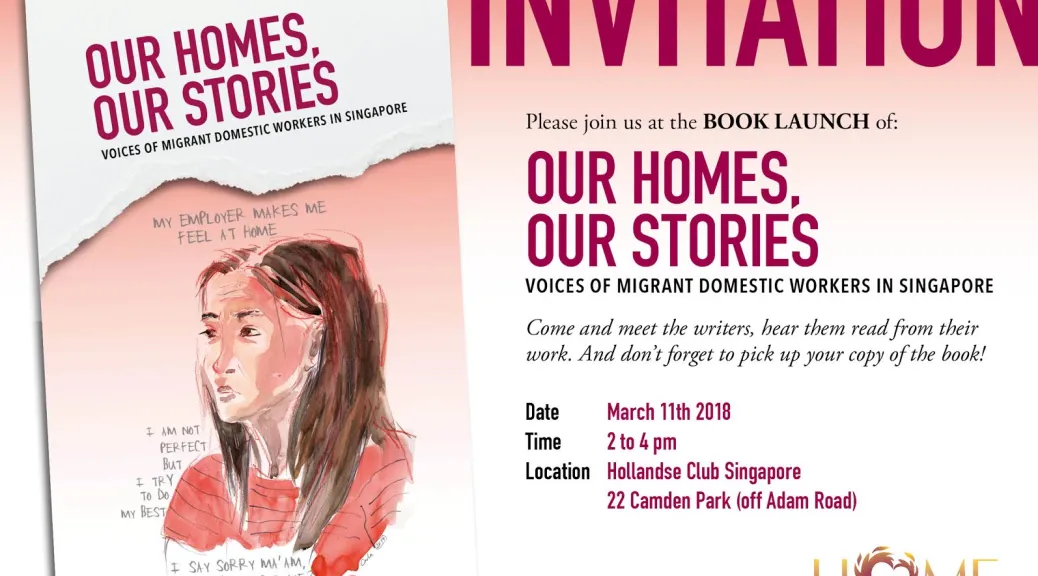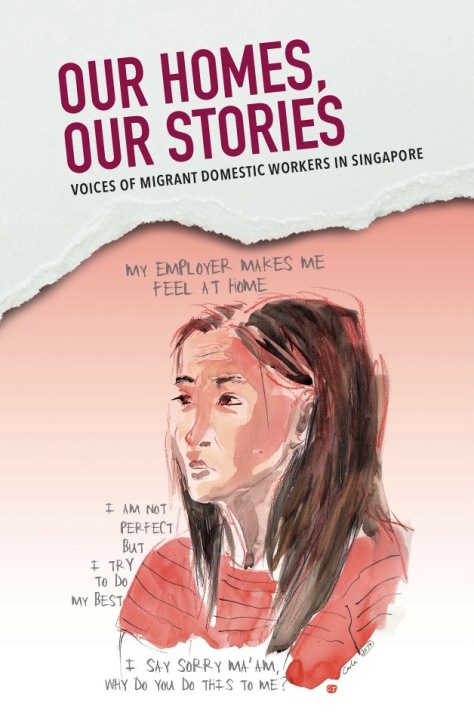This week we interview Thala, who is from Myanmar. In the book Our Homes, Our Stories she describes how she had to take care of elderly people suffering from dementia. One of them behaved aggressively towards her, and threatened her with a knife. As Thala is a teacher, not a professional caregiver, she felt unsafe and eventually ran away. For the book Thala worked with a Burmese speaking volunteer to write down her story. The interview below was conducted in English, via messenger, as Thala is currently back in Myanmar.
The first time I came to Singapore I was worried because I was in a strange country, with strange people; I did not know my employers and I only spoke a little English. I have had four employers in Singapore now, and two of them I loved. They have two ears, two eyes, and one mouth. Just like my family.
My first employer was good, but I did not feel safe working there, as the old grandfather I took care of touched me inappropriately. The problem was, when I first came to Singapore they cut my salary for seven months. And every time I wanted to change employers, I had to pay two more months of salary. But I did not have much of a choice. At the time I had no handphone, no day off. And my family is very poor, so I needed to take any job my agent offered me. But I was very scared every time I started a new job.
My second employer, where I also took care of an old man, gave me an Ang Bao envelope at Chinese New Year. I was so happy as I had not had any money yet in the nine months I worked in Singapore. But my employer’s father was jealous, and threatened me. This is the story I wrote down while I was in HOME shelter. They put my story in the book, so other people can learn what it was like for me. The old man was ill, he had dementia, so he did not know what he did. But he was dangerous. He hit me with a bamboo stick and tried to hurt me with a knife. I felt unsafe; I did not know how to deal with someone like that. In Myanmar, I used to work as a teacher. So I called the police.
After that I stayed in the HOME shelter. HOME is a good organization. They also have classes at their shelter, cooking, English, yoga, and the writing class. I like to write. I wrote several poems when I was there. When I was writing, and when the volunteers interviewed me, sometime tears would come down my face. They were so nice to me, handed me tissues and hugged my body. The people at HOME make you feel safe.
I found another employer after I left the shelter, but they have now left Singapore. I am back in Myanmar. I have not worked for the last three months, and because I am the sole financial supporter of my family, I really need a job. But it is difficult to apply from Myanmar. I don’t have an agent. If I would get an agent, they will charge me so much money again.
A poem by Thala
So many women want to forget about their life
Because life is rarely easy
I try to make my life lovely by thinking
I don’t want to be poor
So every day
I think, and think about a good life
This is my system
This is how I cope
Everybody has so many problems.
You cry, or you try
Don’t cry forever
Home organisation is very good.so many maid run away home is supports them.
Home have so many ladies they go acativy. they learn cooking class. breaking class.Yoga & body message.
yes sister
i’m writing sister.
now i’m cooking
i’ve 4 employer.i love 2 family. because they have two eyes & two ear.one mouth.
my first employer is good.but not safely.
i come singapore is first time.i’m worry.because is not my family.not my country.then i can speak a little big english.
i come singapore first time agancy cut my salary. 7 months
first employer no good
i try another employer my agancy find for my job
i’ve second employer.they cut next 2 months my salary.
total 9 months. can’t choice my dear.because i’m not have hand ph. no off day. so sadness this time. my family very poor.i want high salary. so i come singapore. but this agancy cuts my salary 9 months.must be so scare my agancy.
l decided my self. i work second employer.i take care old man.
this house have 3 people.
he is 93 years old.he is crazy man. my duty is take care him.
i work this house 26.5.2016.around 9 months finished chinese new year
His family give chines new year envelope.
He say to me this envelope has some money.
he want this money. his son say is this for yours.(me).
oh.i’m happy. i work nine months. i don’t have money.
i see first time this is my money.
old man jelous to me. this money he want.
next day he say to me again. u go back ur country. he don’t want to see me
later he bring knife.he say to me.he want to die. u kill me.i kill u. die is good.
i say old man.l talk very softy old man. please give me this knife.u want this money i give u. he not agree.he want to kill me.so i make careful this hand have kinfe i bring away.
he more than angry. he go kitchen have another knife bring again.he has knife throw my body.
must be so scare & very worry. i call his son phone.
old man very angry & shouting to me.he bring bamboo stick .he beat my back side.
i’m hiding the chair. he shout & shout to me.
he beat my back side. too pain i say him. i call police. i call faster police. later 30 minutes police come this house.
police say to me.not safely this house. they bring police station to me. i say i wait his son. police say to me.ok we wait together. later his son come this house. i say this case. police keep my passport & work permit.
police say to me.u go back myanmar or go back agancy
i’m not have money. i don’t want to go back myanmar.
no good agancy i ‘m not come back.
february last week i’ve police case. so sadness my heart.my tear come out every day. i don’t want problem. i want money but i’ve police case.
police bring to me CDE shalter.no good very bad this shalter.
this time my heart too pain. this shalter have so many myanmar ladies.i asked her.they live this shalter in 10 months plus.i’m afraid.i don’t want to live in this shalter.
i want to see this shalter leader. not have.they live other house.
so i’m shouting & crying. how to supports my daddy. money months i work maid life agancy cut all. i’m not have money. my heart too pain. who help to me ples
who contact shalter leader.i don’t know. later 50 minutes Mr mi
Mikle come this shalter.
i don’t want to live in this shalter. he say why?
this shalter have leader not warmly.she say to me first time my smelling have presion.
u know Mr.Mikle. my heart to pain. i don’t want problem. but i’ve police case .who help to me. is this not dream. R
he say to me. where want to live u? l want to live in home. he say again.home is where? i hear city hall have home.
how to konw u? i use fb. i see ever home page.
he promise to me.next 3 day he bring home. un belive Mr Mikle.i told him.he say again. i’m gentle man. not lie.he request again.please patient lady. i help u.i say again may be 3 days u not come i make this shalter is fire burning. his eye brightness.(O my Godness).
one day 3 times they give food.morning water & bread.lunch hot dog.dinner rice & meat.
around 3 days he bring to me home office.city hall
l live in home around 5 months. they contact MOM for my special pass.home have runner.translate.so many volounteer.
Home have leader very good heart.ever smile & warmly. one week one time come to doctor.cooking class breaking class.Eng speaking & care givers.painting & drawing class. sometimes hand make.
important is a good lawer. very patient staff. they asked my interview time my tear come out they give tissue & wave my body.so kindness
Your story will be part of the book coming out. Do you remember writing it with the volunteer?
Do you like writing?
sometimes go to acativy.
yes. i’m very like writing.
You like writing your own story?
Who do you hope will read it?
i want to new job. in singapore.but not easy.
Do you have agent?
not have sister
i’m not have job 3 months
please help me sister. i want to work in singapore. because my supports my daddy alone.
Let me ask around
yes sister.
i go china.CHENG DU
not safely.
i can’t speak chinesse
i come back myanmar


























































